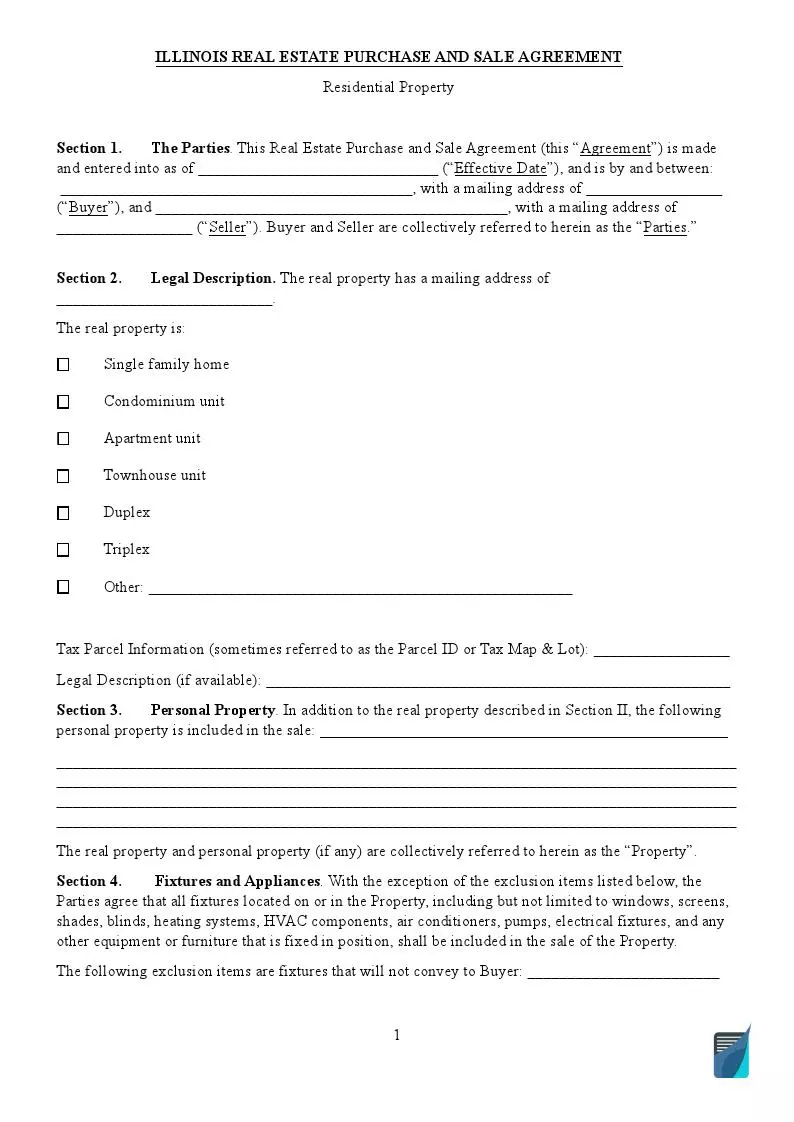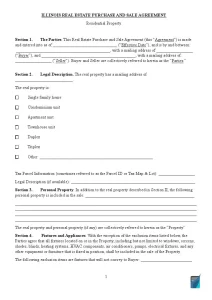Illinois Real Estate Purchase Contract
If you are willing to buy a real estate unit in the state of Illinois, you need to compile and sign the Illinois Real Estate Purchase and Sale Agreement. The purchase agreement contains the necessary details and, most importantly, the terms of a sales transaction. Both parties to the property sale need to ensure the deal is safe and reliable. Below, we will tell you about the conditions and requirements that need to be fulfilled to achieve that goal.
There are two primary types of real estate covenants depending on the property type the buyer is willing to purchase. So, if the property unit is residential, you will use a Residential Purchase Agreement template. But if you are looking into commercial property, you will need to fill out and sign the Commercial Purchase Agreement to transfer the property rights and title.
These two types of agreement may differ entirely, but they sure do have certain filing peculiarities one needs to consider when composing the agreement form.

Build Your Document
Answer a few simple questions to make your document in minutes
Save and Print
Save progress and finish on any device, download and print anytime
Sign and Use
Your valid, lawyer-approved document is ready
Illinois Residential Purchase and Sale Agreement
The fillable real estate sales contract serves to close a sales deal involving residential property legally. Typically, it is a good legal practice to hire a mediator (a notary public) to witness the sales transaction and ensure everything is done following the local norms and laws. You might as well use the help of a real estate agent if you are not familiar with the tangible property regulations and are afraid to miss out on something important.
Traditionally, such agreements enclose the promises and regulations that guarantee the property is in good condition and the payments are made in full and in due time. In some cases, it is legally required to reveal detailed information about the property’s condition. There are special disclosures for each case, and we will consider them later in this article.
The Illinois Residential Purchase and Sale Agreement should mention the following details:
- Price and payment order
- Property’s condition assessment
- Title survey (if applicable)
- Inspection terms and period
- Liabilities of both parties
- Licensed real estate agent information (if applicable)
- The necessary disclosures
- Attorney’s fees (if applicable)
- Additional terms and conditions
- Actions in case of an emergency
When monitoring the home’s condition, the seller is obliged to provide detailed information about the residence in the standardized State disclosure form. The buyer, in turn, is responsible for checking the dwelling unit for substantial flaws or damage before signing the covenant. After signing it, any claims on this matter would be technically void as the buyer has agreed the property’s condition was sufficient by putting a signature.
Illinois Commercial Purchase and Sale Agreement
This type of real estate agreement serves to close the deal between the buyer and the seller regarding a property unit meant for commercial purposes. The procedure is quite simple, but the sides can also agree to use legal assistance and include respective fees in the agreement form.
The commercial property agreement does not differ much from the residential one in terms of contents. The primary difference is that residential covenants usually concern the sale of a single property unit and involve more modest amounts of payment based on the local housing prices. While the commercial agreements operate with much more significant amounts, they may also cover a sales transaction over a set of commercial or industrial buildings and thus are more complicated.
Required Seller Disclosures in Illinois
Both sides must compose, fill out, and submit a series of disclosures along with the agreement for safekeeping.
Residential Real Property Disclosure Report (765 ILCS 77/35)
The seller must complete this form before initiating the selling process and provide the completed template to a potential buyer in advance. The seller has the right not to disclose additional details about the unit except for the information that goes on the disclosure form.
Proving the disclosure is a mandatory step in implementing the real estate purchase and sale agreement. However, if the owner has never resided in this residential property unit, they may bail on providing the information based on the lack of it.
Lead-Based Paint Disclosure
The US regulation regarding lead-based paint is stringent and straightforward. All dwelling and commercial units built before 1978 must undergo an inspection for lead paint traces. They may and will cause significant damage to the owner’s health and overall well-being. Therefore, the seller must provide this disclosure along with the agreement form.
Radon Disclosure Pamphlets (420 ILCS 46/10)
The seller must provide the buyer with two additional documents to get them acquainted with the threat of radon. Those documents are the Radon Testing Guidelines and the Illinois Disclosure on Radon Hazards.
You can find all the necessary details on the radon testing process on the official Illinois Emergency Management Agency website. We highly advise you to do your research before buying any tangible property because it concerns your health and the health of your family members and loved ones directly.
Dual Agency Disclosure (225 ILCS 454/15-45)
This form is used to notify that the licensed real estate agency providing legal assistance in concluding the deal may represent more than one party to the agreement. The disclosure provides legal grounds for such actions.
Consumers’ Guide to Real Estate Agency in Illinois (225 ILCS 454/15-35)
That is a crucial document for a new homeowner or commercial estate owner in Illinois. It contains all the requirements and regulations currently applied towards estate agencies operating in the state. If you want to avoid fraud or prevent any unlawful actions when purchasing property, you should prepare and sign the Designated Agency Disclosure.
Notice of No Agency
If either one or both parties to the deal refuse to hire an agency to represent their legal interests, they must provide a special disclosure confirming they are doing it by will and have no objections to the fact that the other party is using such assistance.
